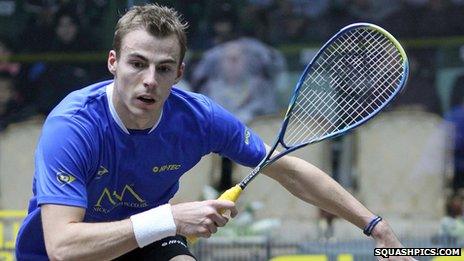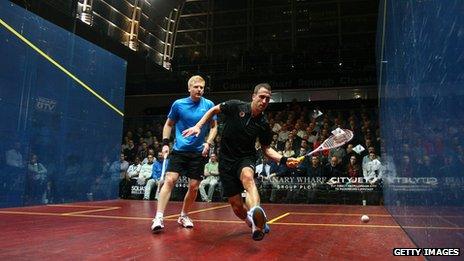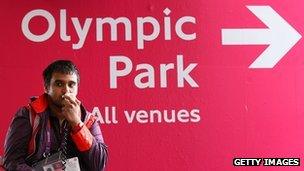Squash stars hope for Olympic bounce in earnings
- Published

Nick Matthew: "Squash is in an unusual place in terms of securing investment"
Squash could be about to change in a way that would guarantee increased future investment in the game and a greater income for its players.
It is one of eight sports due to present a bid to the International Olympic Committee executive board in St Petersburg on 29 May for inclusion in the 2020 Olympic Games.
"Recognition as an Olympic sport would accelerate the growth plans we're making," says Alex Gough, chief executive of the Professional Squash Association.
"If we are included in the 2020 Olympics, we'd expect investment in the sport to double within the next three to four years," he adds.
'Struggling'

Joe Lee is in a worse financial position than friends of the same age
Squash is one of the better funded non-Olympic sports: Sport England has pledged to contribute almost £5m of funding in talent and elite programmes up to 2017.
However, as things stand, even top players often struggle financially compared with their equivalent rankings in other sports.
Joe Lee, England's ninth-ranked player and 39th in the world league, has no sponsors other than members of his club, "who might give me £500 to wear their logo on my shirt for a year". His main income is from England Squash & Racketball, which receives money from the National Lottery.
He supplements his earnings by occasionally playing professional league games, which can earn players a few hundred pounds per appearance. But he is concerned about the impact these extra activities can have on training.
"I'm lucky because my parents have supported me a lot. They've never wanted me to coach because it would take too much time away from my training."
Increase in support expected
Joe, who is 23, says he is in a worse financial position than friends of the same age.
"One of my friends is the manager of a budget hotel and another plays football for a Conference team. They both earn more money than I do."
World No 31 Alan Clyne, who receives the majority of his funding from Scottish Squash and Racketball, says he is lucky compared with others.
"Many very good players are forced to give up the quest because it is just too expensive to travel and compete, as well as scratching out a living," he says.
"I'm a qualified physical education teacher and could be earning much more working in that role than I do at the moment. Squash players, recognised as some of the fittest athletes in the world, do not even compare in earnings to those who play tennis."
Struggle for wide appeal
Alan, the only Scottish player in the top 50, says that Olympic recognition would give players' finances a much needed boost.
"I would expect a general increase in sponsor support for the sport, which would carry over to all levels of the game, potentially with a much richer professional tour that benefits all players."

The introduction of clear walls has improved the spectator experience
Higher up the world rankings, finances become more secure. Nick Matthew is currently world No 2 and makes his living solely from the game.
"For me it's different; my income is split evenly between 40% from tournament earnings and 40% from sponsorship. The rest comes from funding and exhibition matches."
Matthew's sponsors all have an association with the sport. Squash currently struggles to widen its appeal to non-sporting companies, he says.
"Squash is in a slightly unusual place in terms of securing investment. It doesn't satisfy the desire by some to be associated with a charitable cause and it hasn't got the profile yet to attract those companies who want to be associated with stars who have David Beckham-type profiles."
Growing participation
Alongside squash, also seeking to gain Olympic status are karate, baseball and softball, sport climbing, wushu, a martial art, roller sports, and wrestling, which was surprisingly dropped after an assessment by the IOC of all 26 sports featured in the London 2012 Games.
Squash is currently a minority appeal sport and is primarily broadcast on specialist online channel Squash TV . But according to Andrew Shelley, chief executive of the World Squash governing body, the sport has improved its offering in recent years.

Squash wants to be part of the Olympic Games action in 2020
"One of the main challenges that the sport faced was making it spectator-friendly; all-glass show courts were utilised for the first time in 1982. Now that camera and image quality has improved, the sport can be enjoyed on TV much more easily.
"Winning the bid isn't the be-all and end-all, but we want our athletes to be able to participate at that level. But we'll try to grow participation in the sport, even without that recognition," Mr Shelley tells BBC News before travelling to St Petersburg for the pitch.
The IOC is expected to reach its final decision on which sport to include after a vote in Buenos Aires on 10 September.
Former world No 1 Peter Nicol is positive about the future. "The sport is becoming much more high-profile," he says.
"Obviously the focus is on the bid and getting squash into the 2020 Olympics. It has focused the associations and governing bodies to work together for the benefit and promotion of the game. And this will continue, regardless of the result."